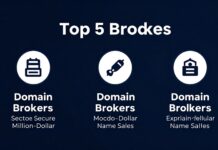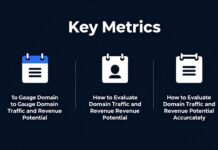In the ever-evolving landscape of domain ownership, the latest rules from the Internet Corporation for Assigned Names and Numbers (ICANN) are set to shake things up. If you’re a domain owner, you might be wondering: what do these new regulations mean for you? As the steward of the global domain name system, ICANN’s decisions can have significant implications on how you manage, protect, and utilize your online assets. Are you prepared for the changes ahead, or will you be left scrambling to adapt?
Understanding ICANN’s latest rules is crucial for every domain investor and business owner alike. These regulations touch on critical topics such as domain registration, privacy, and security measures that can directly affect your online presence. With heightened scrutiny on domain transfers and ownership verification, the need for vigilance has never been more pressing. Are you aware of how these changes could impact your current domains? The clock is ticking, and being informed is your best defense against potential disruptions.
Moreover, these new ICANN rules aim to enhance domain security and combat issues like cybercrime and identity theft. However, they also present challenges that could complicate your domain management strategies. Are you equipped with the right tools and knowledge to navigate this new landscape? This article dives deep into ICANN’s latest updates, providing you with essential insights and actionable tips to ensure you remain compliant and secure. Don’t let these changes catch you off guard—read on to discover how to protect your digital assets and stay ahead in the competitive world of domain ownership!
Understanding ICANN’s New Regulations: 5 Key Changes Every Domain Owner Must Know
Navigating the waters of domain ownership can be tricky. With the latest regulations from ICANN, domain owners must stay informed and ready to adapt. The Internet Corporation for Assigned Names and Numbers (ICANN) has introduced several key changes that affect how domain names are managed. Ignoring these updates could lead to penalties or even loss of your domain. Here, we’ll break down five major changes that all domain owners should know about.
1. Enhanced Privacy Protections
One of the standout changes in ICANN’s new regulations is the increase in privacy protections for registrants. Previously, personal information like names, addresses, and emails were publicly accessible through WHOIS databases. Now, ICANN’s updated rules require registrars to offer enhanced privacy options, which allow owners to shield their data from public view. This is great for those who want to keep their information private, but it also means owners must opt into these services, as they might not be automatic.
2. Stricter Verification Processes
ICANN is now enforcing stricter verification processes for domain registrations. This means that, upon registering a domain, owners may need to provide documentation to prove their identity and the legitimacy of their business or personal use of the domain. Failure to comply can lead to automatic suspension of your domain. Registrars will be required to conduct random audits, so having accurate and verifiable information is essential.
3. Changes to Domain Transfer Policies
Transferring domains used to be a straightforward process, but recent rule changes have added layers of complexity. Now, domain owners must initiate a transfer request and confirm it through a registered email. If the owner does not respond, the transfer can be delayed indefinitely. Plus, there’s a new 60-day lock period after making changes to registrant information, preventing immediate transfers. This is something that many owners might forget, leading to potential frustrations.
4. Increased Fees for Non-Compliance
ICANN is also implementing increased fees for those who do not adhere to their new regulations. These fees can add up quickly and vary based on the severity of the non-compliance. For example, if a domain owner fails to verify their information within a designated timeframe, they might face fines that could range from $50 to hundreds of dollars, depending on the situation. This is a significant shift, as it places more financial responsibility on the owner to stay compliant.
5. Periodic Reviews of Domain Registrations
Lastly, ICANN has established a framework for periodic reviews of domain registrations. This means that every few years, domain owners will be required to confirm their registration details and ensure compliance with the latest regulations. Failure to do so can result in the loss of the domain. It’s not just a one-time task; it’s an ongoing responsibility that may catch some owners off guard.
Key Takeaways for Domain Owners
To summarize, here are the key changes that every domain owner must be aware of:
- Enhanced privacy protections now available but require opting in.
- Stricter verification processes for domain registration.
- Updated transfer policies with new confirmation steps.
- Increased fees for non-compliance, which can accumulate quickly.
- Periodic reviews of registration details, leading to potential domain loss.
Are You Prepared?
With all these changes, it raises the question – are you prepared to adapt to ICANN’s new regulations? Many domain owners might feel overwhelmed by the sudden influx of new rules. However, staying informed and proactive is your best defense. Make sure to check with your registrar about how these changes affect your current domains and what steps you need to take to remain compliant.
It’s crucial to regularly review your domain registration details and privacy settings. Consider setting reminders for when you need to verify your information or when periodic reviews will take place. Keep an open line of communication with your registrar, as they can provide valuable guidance on navigating these updates. Being proactive can save you from headaches down the line.
As the landscape of domain ownership continues to evolve, being aware of these ICANN regulations is more important than ever. Don’t let the complexities of the domain world overwhelm you; instead, take charge and ensure you’re following the latest guidelines.
Are You Ready for ICANN’s New Rules? 7 Essential Steps to Protect Your Domain Assets
Are you ready for ICANN’s New Rules? It’s a question that many domain owners are asking these days, especially with the recent updates from the Internet Corporation for Assigned Names and Numbers (ICANN). Domain management is crucial, and changes in regulations can have a significant impact on how you protect your domain assets. Let’s break down what ICANN’s latest rules mean for domain owners and the essential steps you should take to safeguard your investment.
What Are ICANN’s Latest Rules?
ICANN’s new rules are designed to enhance security and promote accountability among domain registrars and registrants. These changes come after years of discussions and research, aiming to create a more transparent and trusted domain name system. Some of the key points include:
WHOIS Data Accuracy: Registrars must ensure the accuracy of WHOIS data. This means that if you own a domain, your contact information must be up to date.
Privacy Protection: New regulations enhance privacy protection for domain owners. However, this doesn’t mean complete anonymity.
Transfer Policies: The policies governing how domains are transferred between owners have been updated to prevent unauthorized transfers.
Dispute Resolution: Changes in dispute resolution processes mean domain owners need to be more aware of their rights.
Understanding these rules is critical for anyone who owns a domain. So, what should you do to prepare?
7 Essential Steps to Protect Your Domain Assets
Review Your WHOIS Information
The first step is to ensure that your WHOIS information is accurate. If there’s a mistake in your contact info, you could lose your domain.Enable Domain Privacy
If you don’t want your personal information to be publicly available, consider using a privacy protection service. This can shield your data while still complying with ICANN’s requirements.Understand Your Registrar’s Policies
Each registrar may interpret ICANN’s rules slightly differently. Familiarize yourself with your registrar’s specific policies to avoid surprises.Stay Informed About Transfers
If you plan to transfer your domain to a new registrar, understand the new transfer policies. Sometimes, there’s a waiting period after registration before you can transfer.Know Your Rights in Dispute Resolution
Familiarize yourself with the updated dispute resolution processes. Being aware of your rights can save you time and stress if conflicts arise.Regularly Update Your Information
Make it a habit to review and update your domain information regularly. This can prevent any issues related to outdated contact details.Backup Your Domain Data
Keeping a backup of all your domain-related data is crucial. In case of any disputes or issues, having documented proof can be invaluable.
The Impact of ICANN’s Changes
It’s essential to understand how these new rules affect you as a domain owner. Here’s a quick comparison of the old vs. new rules:
| Old Rules | New Rules |
|---|---|
| Less emphasis on WHOIS accuracy | Strict accuracy requirements for WHOIS data |
| Limited privacy options | Enhanced privacy protection measures |
| Simpler transfer process | More stringent transfer policies |
| Basic dispute resolution | Improved frameworks for dispute handling |
These changes can seem overwhelming, but they ultimately aim to create a safer and more transparent online environment.
Real-World Examples
Consider a situation where a domain owner fails to update their WHOIS information. If someone else registers a similar domain and disputes ownership, the original owner may find it difficult to prove their claim. By keeping your information current, you’re protecting yourself against potential disputes.
Another example involves domain transfers. If you’re planning to switch registrars, not knowing the waiting period could lead to unnecessary delays. Awareness of the new rules can help streamline the process.
Be Proactive, Not Reactive
The best way to deal with ICANN’s new rules is to be proactive. Don’t wait until an issue arises to take action. By following these steps, you can ensure that your domain assets remain secure and compliant with ICANN’s regulations.
Keeping up with domain management may seem like a hassle, but it’s necessary in today’s digital landscape. As a domain owner, you have a responsibility to protect your assets, and understanding these new rules is a vital part of that process. So, are you prepared to take the necessary steps? Don’t wait until it’s too late; act now and secure your domain’s future.
The Impact of ICANN’s Latest Guidelines: How They Will Transform Domain Ownership in 2024
The domain landscape is set to shift significantly as ICANN introduces new guidelines in 2024. For domain owners, these changes could alter the way they manage, buy, and sell domain names. Understanding these guidelines and their implications is crucial for anyone involved in domain ownership.
What Are ICANN’s New Guidelines?
The Internet Corporation for Assigned Names and Numbers (ICANN) has been pivotal in governing domain name registrations and ensuring a stable internet. The new rules coming into effect in 2024 aim at enhancing security, increasing transparency, and providing more robust rights for domain name owners. Here are some key aspects of the guidelines:
Enhanced Security Protocols: Domain owners will be required to implement stronger security measures, which includes two-factor authentication and regular audits of their domain registrations.
Increased Transparency: The new guidelines mandates registrars to provide clearer information about the ownership and transfer process of domains.
New Dispute Resolution Processes: ICANN introduced streamlined procedures for resolving ownership disputes, which could benefit owners facing challenges regarding their domain names.
Historical Context of ICANN’s Guidelines
ICANN has been revising its policies periodically to adapt to the changing digital landscape. The last major overhaul occurred in 2016, focusing primarily on WHOIS data and privacy concerns. The 2024 guidelines are seen as a response to growing concerns over cyber threats, domain hijacking, and the need for better dispute resolution mechanisms.
- 2016 Reform: Focused on privacy and data protection.
- 2024 Update: Aims to strengthen ownership rights and enhance security.
How Will the New Rules Transform Domain Ownership?
With these changes, the way domain owners interact with their assets will be different. Here are some of the potential transformations:
Greater Control Over Domains: Owners will have more control over the information associated with their domains, which could lead to better management of their digital portfolios.
Fewer Disputes: Improved dispute resolution processes could mean that ownership challenges are settled more quickly and fairly, reducing the stress for domain owners.
Increased Costs: While the guidelines aim to protect domain owners, implementing new security measures could come with additional costs. Owners should prepare for possible price hikes from registrars.
Are You Prepared for These Changes?
As these changes are approaching, domain owners need to evaluate their current strategies. Here are some steps to consider:
Review Security Practices: Ensure that your domain registrar offers two-factor authentication and understand how to implement it.
Stay Informed: Follow updates from ICANN and your registrar to keep up with any changes that may affect your ownership rights.
Evaluate Your Portfolio: Take a look at your domain names and assess their value. Are they secure? Are you ready to defend them?
Potential Challenges for Domain Owners
Despite the benefits of ICANN’s new guidelines, there are challenges that domain owners must remain aware of:
Increased Complexity: The new rules might introduce complexities in managing domains, especially for those who are not tech-savvy.
Potential Financial Burden: The cost of compliance with new security measures could be a burden, especially for small businesses or individual owners.
Need for Continuous Education: As the guidelines evolve, continuous education about domain management and security will be essential.
What Should Domain Owners Expect?
Here’s a quick look at what domain owners can expect from ICANN’s latest rules:
Expectations:
| Expectation | Description |
|---|---|
| Enhanced Security | Stronger protocols to protect domain ownership. |
| Clearer Ownership Information | More transparency about domain registration processes. |
| Streamlined Dispute Resolution | Faster resolution of ownership disputes. |
Practical Examples:
A domain owner who fails to adopt two-factor authentication could risk losing their domain to cybercriminals.
Owners who do not update their contact information may find themselves in a tough position when trying to recover a domain.
With the arrival of ICANN’s new guidelines, domain ownership will enter a new era in 2024. Owners must be proactive in understanding how these changes will affect them. Those who adapt quickly will likely find themselves better positioned to navigate the evolving domain landscape.
Staying informed and prepared is crucial, as the digital world continues to grow and change. The future of domain ownership is here, and it’s essential to be ready for the journey ahead.
Navigating ICANN’s Rule Changes: Top 10 FAQs Every Domain Owner Should Consider
Navigating the landscape of domain ownership can be tricky, especially with the recent changes made by ICANN. As the organization responsible for overseeing the domain name system, ICANN’s new rules can have significant impacts on domain owners. If you’re a domain owner, you might be wondering what these changes mean for you. Here’s a look at the top 10 FAQs regarding ICANN’s latest regulations and how they may affect you.
1. What are ICANN’s latest rules?
ICANN has implemented several new rules, which includes changes in the registration process, domain transfers, and privacy protections. These changes aim to enhance security, improve user privacy, and streamline procedures.
2. How do these rules affect domain registration?
One of the most noticeable changes is the stricter verification requirements for domain registrations. Domain owners must now confirm their identity and contact information more rigorously. This means that if you want to register a new domain, be prepared to provide detailed information.
3. Are there changes to domain transfers?
Yes, ICANN’s new rules imposes more stringent guidelines on domain transfers. For example, you now need to ensure that the domain is not locked and that you have the right authorization code. Failure to follow these guidelines can delay or even prevent your transfer.
4. What about privacy protections?
ICANN has enhanced privacy protections for domain owners. This means that your personal information may be better shielded from public view. However, some of the rules require that you still provide accurate info to ensure compliance, which can be a bit of a balancing act.
5. Will there be fees associated with these changes?
It’s likely that some registrars may increase fees due to the added administrative work required by these new rules. It’s important for domain owners to review their registrar’s fee structure regularly to avoid surprises.
6. How will this affect my current domains?
If you already own domains, you might not see immediate changes. However, it’s crucial to stay informed about how these rules apply to your existing domains, especially when it comes time for renewal or transfer.
7. What happens if I don’t comply with the new rules?
Non-compliance can lead to various consequences, which includes losing your domain or facing delays in services. It’s essential to keep your registration details up to date and follow the new guidelines.
8. Can I still use a privacy service for my domains?
Yes, privacy services are still allowed under the new ICANN rules. However, you need to ensure that your registrar provides this option and that you’re aware of any limitations imposed by your registrar.
9. How can I stay updated on ICANN’s rules?
The best way to stay informed is to regularly check ICANN’s official website and subscribe to newsletters from your domain registrar. Joining forums or communities related to domain ownership can also provide valuable insights and updates.
10. What should I do to prepare for these changes?
Preparation is key. Here are some practical steps you can take:
- Review your contact information and ensure it’s accurate.
- Familiarize yourself with your registrar’s policies regarding transfers and renewals.
- Consider setting reminders for important dates related to your domains.
- Stay engaged with the domain community for tips and updates.
ICANN’s Impact on Domain Ownership: A Historical Context
For those not familiar, ICANN was established in 1998 to oversee domain name registrations and ensure stable and secure operation of the internet. Over the years, ICANN has made numerous changes in an effort to adapt to the evolving digital landscape. The latest changes reflect the growing concern for user privacy and the need for robust security measures.
In previous years, domain owners often faced fewer regulations. However, as cyber threats have increased, so has the need for more stringent policies. This shift has led to a more secure internet environment, but also creates challenges for domain owners.
What ICANN’s Changes Mean for You
As a domain owner, it’s crucial to understand that these changes are not just bureaucratic red tape. They’re designed to protect you and your online presence. While it may seem inconvenient at times, these regulations can ultimately lead to a safer and more trustworthy domain environment.
With the digital landscape continually evolving, staying ahead of the curve is important. Make sure you’re not just informed, but prepared to adapt to these changes. The more proactive you are, the better you’ll be able to navigate the complexities of domain ownership in this new regulatory environment.
Maximize Your Domain Value: Expert Tips on Adapting to ICANN’s New Policies
The world of domain ownership is always changing, and ICANN, which is the Internet Corporation for Assigned Names and Numbers, is a significant player in this space. Recently, they announced some new policies that could impact domain owners in various ways. Understanding how these changes might affect your domain value is crucial. So, let’s dive in and explore how you can maximize your domain value while adapting to ICANN’s new rules.
What ICANN’s Latest Rules Mean for Domain Owners
ICANN’s new regulations are aimed at improving the overall stability and security of the domain name system. But what does this mean for you, the domain owner? Here are some of the key changes and their implications:
- Increased Transparency: New policies call for more detailed reporting on domain registration data. This means that domain owners may have to disclose more information about themselves.
- Data Protection Compliance: With GDPR and other data protection laws, ICANN’s rules are aligning with these regulations, ensuring that domain owners’ data is protected.
- Changes to Renewal Policies: ICANN is also updating how domain renewals are handled, which could affect your renewal costs or deadlines.
Are You Prepared for These Changes?
It’s essential to prepare for these changes. Many domain owners don’t realize how these rules might impact their operations. Here are some tips to get ready:
- Review Your Registration Information: Make sure your contact details are updated and comply with the new transparency requirements.
- Educate Yourself on Data Protection Laws: Understanding GDPR or similar laws can help you navigate the complexities of data protection as it relates to your domain.
- Stay Informed: Regularly check ICANN’s website or subscribe to their updates to keep track of any future changes.
Maximize Your Domain Value
Maximizing your domain value amid ICANN’s new policies can be challenging, but it’s not impossible. Here are some expert tips that can help you stay ahead:
- Focus on Quality Over Quantity: Instead of owning many domains, it’s better to have a few high-quality ones. Domains that are short, memorable, and relevant to your business can significantly increase in value.
- Invest in SEO: Ensure your domain is optimized for search engines. This can include having relevant keywords in your domain name, quality content on your website, and a good backlink profile.
- Leverage Domain Auctions: Participating in domain auctions can help you acquire valuable domains or sell your own at a premium price.
- Utilize Domain Brokers: If you’re looking to sell, consider using a domain broker who can help you navigate the selling process and connect you with potential buyers.
Historical Context of ICANN Policies
ICANN has evolved since its inception in 1998. Initially, it focused on managing the domain name system and ensuring stability on the internet. Over the years, as the internet grew, so did the need for more robust policies. These latest changes reflect that ongoing evolution. Here’s a brief timeline of ICANN’s major policy shifts:
- 1998: ICANN is formed to oversee domain names and IP address allocation.
- 2005: Introduction of the WHOIS policy, which required registrars to collect and maintain accurate registration data.
- 2014: Launch of the new gTLD program, allowing for a broader range of domain extensions.
- 2023: Implementation of new rules focusing on transparency, data protection, and renewal processes.
Practical Examples of Policy Impacts
Let’s look at a few examples of how these policies may affect domain owners:
- Example 1: A small business owner who has a domain related to their niche may find that the increased transparency leads to more inquiries from potential customers, boosting their business.
- Example 2: A domain investor might need to update their WHOIS information regularly to stay compliant with the new policies, which could lead to additional administrative tasks.
- Example 3: If a domain owner neglects to renew their domain under the new rules, they might face higher fees or even lose the domain entirely.
By understanding these impacts and adapting accordingly, domain owners can not only survive but thrive in this evolving landscape.
In today’s digital age, adapting to changes is a must for domain owners. ICANN’s latest rules may feel daunting, but they also present an opportunity to reassess and enhance your domain strategy. So, stay informed, be proactive, and maximize your domain value while navigating these new regulations.
Conclusion
In conclusion, ICANN’s latest rules represent a significant shift in the domain registration landscape, emphasizing transparency, security, and accountability. Key changes include stricter verification processes for domain owners, enhanced protection for personal information, and a more defined framework for resolving disputes. These updates aim to combat cybercrime and improve trust within the domain ecosystem, ultimately benefiting both registrars and registrants. As domain owners, it’s crucial to stay informed and adapt to these changes to ensure compliance and protect your online assets. We encourage you to review your current domain registrations, update your contact information, and familiarize yourself with the new policies to safeguard your digital presence. By taking proactive steps now, you can navigate these regulatory changes effectively and continue to thrive in the ever-evolving online landscape. Stay ahead of the curve and empower your online journey by understanding and embracing ICANN’s new rules.













